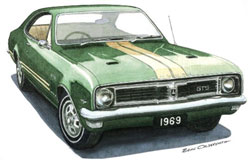- Over 6,000 respondents across 800 motoring clubs in a nationwide Economic Value Study confirm close to $10 billion in annual expenditure on historic vehicles
- An estimated 970,000 historic vehicles in Australia with owners spending close to $10,240 per vehicle per year
- Australian Motor Heritage Foundation: "In carrying out this study, we have shown that the historic vehicle movement is a large and vibrant part of Australia's society and economy"
Sydney, 11th April, 2024 - The owners of Australia's historic vehicles spend some $9.9 billion each year on their passion, according to a new survey.
The Economic Value Study (EVS) of well over 6,000 Australian respondents, distributed to over 800 motoring clubs nationally, was conducted for the Australian Motor Heritage Foundation (AMHF) by The Mercurius Group (TMG). The Foundation is champions of Australia's motor heritage, and an organisation dedicated to promoting and preserving Australia's motoring history.
The enthusiast owners of an estimated 970,000 historic vehicles in Australia spend on average $10,240 per vehicle annually, around 12.5% more than people who own daily driven cars. The historic vehicle fleet represents 4.4% of Australia's 21 million total vehicle fleet. Around 50% of the survey respondents own only one historic vehicle, the other 50% owning two or more vehicles. "Historic" vehicles are in two categories: those 15 to 30 years old defined as "classic" vehicles and those over 30 years old defined as "heritage" vehicles.

Such a survey has never been comprehensively undertaken on so wide a scope or on a national basis in Australia. Following publication of the similar landmark 2020 HERO-ERA study in the UK, the AMHF decided to find out what is the real figure for the economic contribution of historic vehicles for Australia.
"The findings of this report have certainly highlighted the significance of the historic vehicle sector to both the community at large and the economic sector," says Hugh King, Chairman of the AMHF.
"The response from Australia's motoring club members has been unprecedented: the economic modellers at TMG have never had so large a data pool to work with, proving motoring enthusiasts care as passionately about their historic vehicles as they do having their voices heard. In carrying out this study, we have shown that the historic vehicle movement is a large and vibrant part of Australia's society and economy."
The survey also reveals the total annual economic impact, including both direct and indirect expenditure, is $25.2 billion: with the sector creating almost 79,000 jobs - 42,000 direct and 37,000 indirect. These jobs generate $6.2 billion in wages and salaries annually. These are very large numbers by any standard.
Stavros Yallouridis, CEO of the Motor Traders' Association of NSW (MTA NSW), said the AMHF's survey gave yet more irrefutable evidence of the significant contribution of the automotive sector in the broader Australian economy.
"Despite the end of local vehicle manufacturing, Australia maintains a rich and diverse automotive industry, which employs hundreds of thousands of people across a range of roles," Mr Yallouridis said.
"The automotive sector is one of the backbones of our economy and is also at the heart of our communities. This survey, and the enthusiastic response, highlights the necessity for Australia to back its automotive sector with world-class training, local skills development and career pathways," he continued.
Copies of the full report can be downloaded from the AMHF website (www.motorheritage.org.au)
Contact: |
Tom Wheelwright
Position: Director AMHF
Mobile No: 0487 535 873
|

|
About the Australian Motor Heritage Foundation
The Australian Motor Heritage Foundation (AMHF) is dedicated to the preservation of Australia's collective motor knowledge, particularly with the historical knowledge that exists in the thousands of motor clubs across Australia. The Foundation is equally concerned to preserve the history of motor racing, of motor cycling, of aviation in all its forms and of road haulage by truck or bus, with a research library for this express purpose. Through the library, the Foundation aims to make its information available in digital form as widely as possible.
The AMHF's book and magazine collection has tens of thousands of volumes, along with a substantial and growing collection of audio-visual items that includes photos, brochures, prints, film and videos. The AMHF seeks to foster social cohesion through public seminars, lectures and informal gatherings which share its passion for motoring.
About The Mercurius Group
The Mercurius Group (TMG) provides consultancy services on the commercialisation of infrastructure. It helps infrastructure businesses – defined as businesses where large volumes of people congregate in the one location – such as airports, railway stations, cruise ship terminals, universities, hospitals, stadiums, museums and casinos generate untapped commercial revenues from activities such as retailing, food & beverage, car parking and advertising. The team at TMG has carried out similar economic evaluations of the Olympic Games, Ashes Test Cricket and the Rugby World Cup.